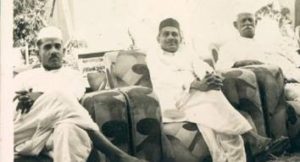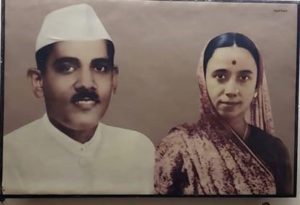In celebration of Asian Pacific Islander Heritage Month this year, we are excited to highlight Jabian employees and learn more about their API heritage and experience. The month also celebrates and honors Asian Americans and Pacific Islanders for their contributions to the United States.
We hope these spotlights shine a light on how everyone can learn more about API heritage and inspire how we can all find ways to celebrate year-round.

Matt Syrett, Director
Q: Are there meaningful people, moments, or advice that have influenced your experience at Jabian?
A: The conversation APIC hosted with TK Nagayoshi back in January and a similar conversation we hosted with Asian public and private sector leaders in March was transformational for me. I really appreciated the support of everyone who participated in the dialogue and the kind words you sent our way after. It helped put words to my experiences and my family’s experiences and helped teach me how to handle challenging situations more gracefully.
Q: Have you experienced any barriers (personal or professional) and how did you overcome them?
A: I have very vivid memories of discrimination – physical altercations, racist jokes, or being excluded from something just from the way I look. As a kid and even into college, I feel like I placed barriers on myself because of those experiences, and people’s comments, insults, and perceptions of me would sometimes become my perception of myself. For me, it was a confidence thing, and having conversations with my parents and a supportive friend group helped me overcome that.
Q: Do you have any role models who inspire you to celebrate your API heritage?
A: My grandmother. She was one of over 100,000 Japanese who were uprooted from their homes and lives and incarcerated in camps during WWII. I can’t imagine what that must have been like for her as a 16-year-old to live through that experience. Most of her experiences I learned second hand from my mom, Grandma didn’t like talking about that with me. But I remember her describing the horse stalls she lived in, the barbed wire and armed guards that surrounded her camp, but also the community and support structures created in the camps to try to make life as normal as possible under the circumstances. She never talked about it, but I know she was strong and resilient. So that’s what I try to be. She’s always in my thoughts but definitely more present this month.
Q: Does your API experience inform and/or enhance your work in consulting?
A: I think being curious about my own background and culture has made me more curious and compassionate about other people in general, regardless of what they look like on the surface. I think that curiosity and openness to talk about my own experiences have helped me develop stronger and deeper relationships with my colleagues and clients.
Q: What are some ways everyone can celebrate API heritage outside of API Heritage Month?
A: Eat our foods and learn about the history behind them! I’m a huge Anthony Bourdain fan and firmly believe that food is the most accessible doorway to culture. Here’s a quote to, um, marinate on. “…food is everything we are. It’s an extension of nationalist feeling, ethnic feeling, your personal history, your province, your region, your tribe, your grandma. It’s inseparable from those from the get-go.” And feel free to invite me on your next culinary adventure 😊.

Ryan Applegate, Executive Director
Q: Is there an API tradition you have or that has been passed down to you?
A: My grandmother used to give me, my sister, and my cousins red envelopes filled with money to celebrate holidays, birthdays, and other significant events. This tradition is very common in China and always reminds me of family. My wife and I carry on this tradition with our daughters and extended family to honor my heritage.
Q: Are there meaningful people, moments, or advice that have influenced your experience at Jabian?
A: A culmination of various conversations, experiences, and discussions with people has taught me to not be afraid to be my authentic self. While there is an appropriate time and place for sharing various aspects of your personality, I’ve found that being authentic leads to more valued relationships with my colleagues and clients.
Q: What are some ways everyone can celebrate API heritage outside of API Heritage Month?
A: I find that one of the best ways to learn about any culture is through food. Experiencing different flavors and then if you’re a nerd like me, you can research the origin stories behind various types of food. With APIHM, there’s such a diversity of cultures which is also represented in the wide diversity of delicious foods.

Claudia Deng, Manager
Q: What does being of API heritage mean to you?
A: To me, being of API heritage ultimately means being grateful for all the sacrifices my parents made to root me in a country where there were better opportunities than in my birth country, China. It means knowing two languages, two cultures, two ways of life, and learning to appreciate both. My parents were the first generation in my family to come to the United States. Although most of my childhood consisted of trying to be more assimilated into American culture, I’ve realized how important preserving my heritage is for future generations. Being Chinese has brought more depth into my life. I’m excited that we live in a time where now more than ever, differences are celebrated, which encourages me to further explore my own heritage while also sharing it with others.
Q: Have you experienced any barriers (personal or professional) and how did you overcome them?
A: Growing up, it was difficult navigating being raised in a very Chinese household, while trying to find my place living an American life. Since I moved here when I was two, being Chinese was always the backdrop to “what I thought I really was”, American. I’ve felt “not Chinese enough”, but also “not American enough” making it hard to reconcile who I really am both personally and professionally. However, I’ve realized it’s important not to package myself in a neat box, because I am still myself whether I am more Chinese or more American. I’m Chinese American and figuring out exactly what that means along the way.
Through introspection and meeting some great role models and friends that have shared experiences, I’ve grown a lot in figuring out what being Chinese American means to me. It’s also been great seeing heightened interest and celebration of different backgrounds both in and outside of the workplace across the board. It’s inspired me to be open and learn more about my own background, who I am, what I stand for, and support those who are doing the same.
Q: What are some ways everyone can celebrate API heritage outside of API Heritage Month?
A: My favorite way of sharing my heritage is through food. There are so many great Chinese restaurants in the Atlanta area, and they always remind me of my parents’ home-cooking. Being able to share that with others and the stories that invariably surface from the experience is a great moment of connection. My recommendations for the Atlanta area are La Mei Zi, Northern China Eatery, and Masterpiece (this one is very spicy Sichuan food, so eat at your own discretion!)

Ryan Yan, Senior Manager
Q: What does being of API heritage mean to you?
A: It means I have the privilege of living out at least two different cultures. It also means that I must constantly both understand and define how the two mesh and meld together.
Q: Is there an API tradition you have or that has been passed down to you?
A: The most obvious examples manifest in our cooking. We have dumpling parties at least a few times a year. A less obvious example is our “no shoes in the house” policy.
Q: Have you experienced any barriers (personal or professional) and how did you overcome them?
A: Plenty, but probably not as bad as it could have been. During interviews, I’ve been asked where I’m originally from repeatedly even after both expressing discomfort with the question and asking the reason behind the question. While the otherization feels terrible, the way I cope and overcome is perhaps not dissimilar to anyone facing a form of adversity: by accumulating leverage and means while uplifting the communities that made me.
Q: What are some ways everyone can celebrate API heritage outside of API Heritage Month?
A: Get a nice meal at a local APA restaurant run by APAs. Watch movies with genuine or at least directionally correct APA representation. Seek to understand traditions and behavior that you might find strange without presuming that your way of living is the only and best way of living.

Manish Shah, Director
Q: Have you experienced any barriers (personal or professional) and how did you overcome them?
A: Growing up as a first-generation with a darker “Asian” complexion in Toronto, Canada in the 70s and 80s, I experienced quite a bit of racism and bullying. It was definitely a tough childhood, however, things started to change for the positive in my late teenage years when open immigration brought hundreds of cultures from all over the world into Canada including those from API countries. Whereas I was one of a few Indian heritage students in elementary, by the time, I graduated high school, the Canadian melting pot had brought more Indians, West Indies, Arabic, and Eastern Asian immigrants to Toronto. Life was much easier for me in college where I could freely celebrate and share my culture, food, music, and love of Bollywood.
Q: What are some ways everyone can celebrate API heritage outside of API Heritage Month?
A: Food is a great way to experience API culture and each time I dine, I always enjoy learning the historic origins of each dish. Some of my Atlanta favorites with Indian menus include Blue India or Tabla for North Indian cuisine and Madras Chettinaad for South Indian. There is also Chai Paani or Curry Up Now for Indian street food. I also like Mughlai in Dallas, Tiffin in Chicago, and Copper in Charlotte. If you happen to have access to Netflix you can watch a show called ‘Raja, Rasoi aur Anya Kahaniyan’ to learn all about the history of Indian food and the intricate use of spices and ayurvedic applications. Note that the last episode (Episode 11) focuses on Gujarati food which is from the region of Gujarat which is where my family originally came from.
Q: Do you have any role models who inspire you to celebrate your API heritage?
A: There are a few well-known figures from the Indian region that definitely inspired me and one of them to note was Mohandas Gandhi with a focus on non-violence and leading a vegetarian lifestyle. I had learned as a child that my family had some unique interactions with the great Mahatma. Both paternal and maternal grandfathers had actually followed and supported the non-violent protests against British rule in the 1930s and 1940s. My great grandfather had actually met Gandhiji (pictured on the far right in the pic with three gentlemen and note that the gentleman on the left in that same pic was my grandfather who I never got to meet as he passed away in the 1960s around 15 years after India received independence from Britain).
My great grandfather had influenced the rest of the family at that time to reduce reliance on Western sourced clothing and only wore simple Khadi clothes which were handwoven clothes made from local Indian-based cotton gins. One notable article of clothing representative of the era was a men’s “topi” or “hat” which you can see in many of our family pictures from that time. Another connection with the great Mahatma was the religion that generations of my family had and continues to follow, called Jainism (rooted in non-violence), which is what heavily influenced the Hindu-born Gandhi to follow non-violent practices in his goal to make India an independent nation.

Manish’s great grandpa pictured with Mohandas Gandhi (far right)

Traditional Topi Hat
